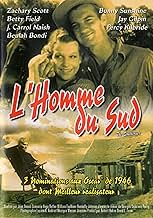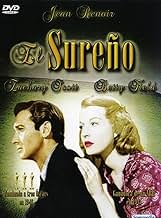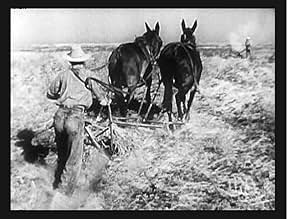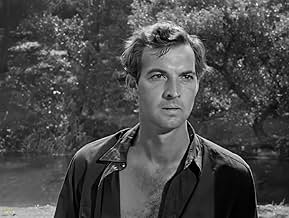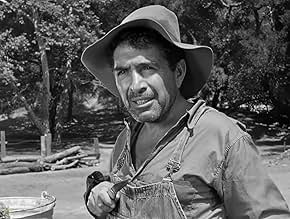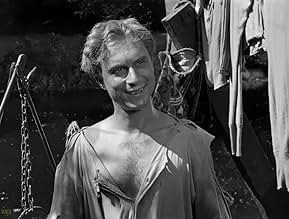IMDb-BEWERTUNG
7,1/10
4124
IHRE BEWERTUNG
Das Leben der armen Familie Tucker, die als Baumwollpflücker arbeitet und beschließt, ihren eigenen Grund und Boden zu erwerben - doch die Natur ist gegen sie.Das Leben der armen Familie Tucker, die als Baumwollpflücker arbeitet und beschließt, ihren eigenen Grund und Boden zu erwerben - doch die Natur ist gegen sie.Das Leben der armen Familie Tucker, die als Baumwollpflücker arbeitet und beschließt, ihren eigenen Grund und Boden zu erwerben - doch die Natur ist gegen sie.
- Für 3 Oscars nominiert
- 3 Gewinne & 3 Nominierungen insgesamt
Paul E. Burns
- Uncle Pete
- (as Paul Burns)
Audley Anderson
- Townsman
- (Nicht genannt)
Rudy Bowman
- Townsman
- (Nicht genannt)
Empfohlene Bewertungen
"The Southerner" is a very good film starring Zachary Scott, Betty Field, Beulah Bondi, Norman Lloyd, J. Carrol Naish, and Blanche Yurka. It's the story of a man, Sam Tucker, working as a cotton picker along with his wife and parents. As his father lays dying in the field, he tells his son to own his own land. Sam quits his job and makes arrangements to work the land of his former boss, with the goal of ownership. He's not welcome by his closest neighbor (Naish) and the house on the land is nothing but a shack. The family nearly starves during the winter; the daughter can't go to school because she doesn't have a coat; his son falls ill with "spring sickness" (probably rickets). Nevertheless, Sam and Nona (Field) keep working, Sam knowing that working the land and feeling the sun is the only way he can live.
This is a very absorbing film. You not only see, but feel the struggles of the family and how hard they work no matter the odds, with strength and determination.
Betty Field was a good choice as Nona - she's plain and tired-looking, with a bright smile. The devotion she has to Sam and he to her is very touching. As a couple, she and Scott are very effective. Beulah Bondi is very good as the irascible, annoying, wizened grandmother either complaining or predicting doom and gloom. Naish gives an excellent performance as a jealous and unhelpful neighbor, and Norman Lloyd is appropriately slimy as his worker. It's always hard to relate the skinny Lloyd, who usually played villains, with the older, revered Dr. Auschlander in "St. Elsewhere" - he's had quite a career. As of this writing, he's 93 and still working.
Zachary Scott is okay as Sam but it's not a comfortable fit. The part required more warmth, more depth, and more internal grit; it's a Henry Fonda role. Still, for not being Scott's normal type of sophisticated or villainous part, he handles it well.
A good film, beautifully directed by Jean Renoir, who was nominated for an Oscar. There are some stunning cinematic moments as well. Worth watching for sure.
This is a very absorbing film. You not only see, but feel the struggles of the family and how hard they work no matter the odds, with strength and determination.
Betty Field was a good choice as Nona - she's plain and tired-looking, with a bright smile. The devotion she has to Sam and he to her is very touching. As a couple, she and Scott are very effective. Beulah Bondi is very good as the irascible, annoying, wizened grandmother either complaining or predicting doom and gloom. Naish gives an excellent performance as a jealous and unhelpful neighbor, and Norman Lloyd is appropriately slimy as his worker. It's always hard to relate the skinny Lloyd, who usually played villains, with the older, revered Dr. Auschlander in "St. Elsewhere" - he's had quite a career. As of this writing, he's 93 and still working.
Zachary Scott is okay as Sam but it's not a comfortable fit. The part required more warmth, more depth, and more internal grit; it's a Henry Fonda role. Still, for not being Scott's normal type of sophisticated or villainous part, he handles it well.
A good film, beautifully directed by Jean Renoir, who was nominated for an Oscar. There are some stunning cinematic moments as well. Worth watching for sure.
I saw this film on a Saturday morning and loved it. It's about a man, his wife, their two children and the grouchy grandma, who are dirt poor (and I mean that literally) farmers. It's based on the book by George Sessions Perry called "Hold Autumn in Your Hand," but the movie and the book are completely different in style and manner. I personally like the movie more, as it showed the family's togetherness much better than the book. A wonderful Renoir film (I think my favourite of all his) and definitely a must see. The courage of the family is really touching. I gave it a...10/10.
Here we have the movie that Jean Renior considered his favorite of all his American efforts. It's truly a forgotten gem from this great director.
It involves the Tucker family, a hard-working but poor clan who toil in the cotton fields as day workers. The family is led by Sam, played by Zachary Scott, accompanied by his lovely wife Nona played by Betty Field. They are accompanied by Beulah Bondi's ornery Granny Tucker, two small children and a frisky little dog. They represent the best of America's hard-working poor, with Sam and Nona truly being dedicated to each other and their family.
We are introduced to them as they pluck cotton beneath the burning sun, hauling huge sacks stuffed with the crop. Suddenly an elder member of the family falters and he is quickly aided by his nephew and his wife, Sam and Nona. Sam takes his uncle's load of cotton, telling him that he'll finish his row. Nona Tucker stays with the old man as he languishes in the fields, flies buzzing around him as he sweats and wheezes. Sam soon rushes back after delivering his cotton, and Nona informs him that his uncle "isn't doin' too good." They give the old guy water, and urge him to hold on, but with his dying breath he tells his young relatives, "...grow your own crop." This advice Sam truly takes to heart, and soon asks his sympathetic boss to let him farm a piece of land on a kind of rent-to-own deal. Sam and Nona's experiences making a life on this fallow piece of land are the focus of the movie.
Truth be told, I've always found talented Betty Field to be one of Hollywood's most unsung and under-appreciated actresses. She seems to generate some vague aura of tragedy, with subtle underpinnings of a quiet sexuality. Her voice has a low register, which also can have a beautiful clear resonance that is unique and memorable. Betty Field was the main reason I was so excited to finally be able to view "The Southerner." And I certainly was not disappointed! Her Nona and Scott's Sam are extremely believable as soul mates and married lovers, and there is a certain erotic electricity in there quiet scenes together.
Zachary Scott'character is earnest, sensitive and ultimately heroic, and his presence lends a quiet soft-spoken American spirit to the proceedings and he voices a soft Southern accent to perfection. His Sam Tucker is intelligent, brave, and determined, and the movie really gives him the opportunity to demonstrate his strength and prowess. Scott is wiry and strong, and his performance is athletic and inspiring. One can easily believe him to be the kind of man who would inspire the love and dedication of his wife and family. His obvious intelligence, goodness and his determination help make his long and difficult journey extremely involving. After a major catastrophe, when Sam experiences dark feelings of hopelessness, Zachary Scott truly conveys the reality of a common guy who questions all his decisions and abilities.
Jean Renoir's ability to capture the distinctly American essence of these characters is remarkable for a director from Europe. He certainly has a fascination and love for the land, and uses the landscape to reinforce the emotional high points of the film. In one remarkable scene, when the couple's young son battles an illness, Nona runs from the family's house into the freshly plowed field, crying as her husband follows her. She throws herself down onto the dirt and hugs the soil as she weeps, and confesses her innermost feelings. Renoir seems to almost turn the dirt and mud of this field into a third character in the scene.
But yes, there are a few elements in "The Southerner" that must disqualify it from masterpiece status. One disconcerting thing was the Hollywood makeup on Betty Field, who was never without mascara and lip gloss even when picking cotton or burning brush off a field. She certainly looked lovely, but also inappropriate for the movie. And the expert character actress Beulah Bondi has some moments where Renoir allowed her to perhaps play it a little too broadly. She's much of the comic relief in the film, and serves this purpose well, but her crotchetiness does begin to grate somewhat. And unfortunately the superb Blanche Yurka is underused as Sam's mother, and she appears so suddenly that it seems some of her scenes must have been cut. Percy Kilbride plays a thankless role as Yurka's suitor, and his screen time could have been used more efficiently.
But other supporting player deliver wonderful little turns in the film. There's Charles Kemper as Sam's rotund best friend and city slicker, Tim. He's likable and warm, and the narration that opens the film is his. He is perhaps the polar opposite of Sam in appearance and philosophy, and lends a voice to the advantages of city living. Then we have J. Carroll Naish as a terse and bitter neighbor who supplies much dramatic impact in his scenes with good guy Sam. The deliberate and thoughtful interplay between these two characters is packed with tension and foreboding. Norman Lloyd as Naish's nasty lowlife farmhand gives a unique performance and seems to bring an almost animalistic quality to his character. Also Dorothy Granger is both frightening and sad as a drunken barroom floozy who doesn't run from a fight.
"The Southerner" could probably be considered "The Grapes of Wrath, Lite." But to view it that way certainly underestimates its own power, and its relevance even today. Stripped to its essence, the movie could be the tale of any close-knit family who struggles to survive and to flourish in an uncaring world. Renior's talent, with the help of a great cast, makes "The Southerner" an impressive portrait of the struggles and rewards of American farm life. It has the ability to resonate in the memory because of both its Hollywood artistry and its gritty Southern strength.
It involves the Tucker family, a hard-working but poor clan who toil in the cotton fields as day workers. The family is led by Sam, played by Zachary Scott, accompanied by his lovely wife Nona played by Betty Field. They are accompanied by Beulah Bondi's ornery Granny Tucker, two small children and a frisky little dog. They represent the best of America's hard-working poor, with Sam and Nona truly being dedicated to each other and their family.
We are introduced to them as they pluck cotton beneath the burning sun, hauling huge sacks stuffed with the crop. Suddenly an elder member of the family falters and he is quickly aided by his nephew and his wife, Sam and Nona. Sam takes his uncle's load of cotton, telling him that he'll finish his row. Nona Tucker stays with the old man as he languishes in the fields, flies buzzing around him as he sweats and wheezes. Sam soon rushes back after delivering his cotton, and Nona informs him that his uncle "isn't doin' too good." They give the old guy water, and urge him to hold on, but with his dying breath he tells his young relatives, "...grow your own crop." This advice Sam truly takes to heart, and soon asks his sympathetic boss to let him farm a piece of land on a kind of rent-to-own deal. Sam and Nona's experiences making a life on this fallow piece of land are the focus of the movie.
Truth be told, I've always found talented Betty Field to be one of Hollywood's most unsung and under-appreciated actresses. She seems to generate some vague aura of tragedy, with subtle underpinnings of a quiet sexuality. Her voice has a low register, which also can have a beautiful clear resonance that is unique and memorable. Betty Field was the main reason I was so excited to finally be able to view "The Southerner." And I certainly was not disappointed! Her Nona and Scott's Sam are extremely believable as soul mates and married lovers, and there is a certain erotic electricity in there quiet scenes together.
Zachary Scott'character is earnest, sensitive and ultimately heroic, and his presence lends a quiet soft-spoken American spirit to the proceedings and he voices a soft Southern accent to perfection. His Sam Tucker is intelligent, brave, and determined, and the movie really gives him the opportunity to demonstrate his strength and prowess. Scott is wiry and strong, and his performance is athletic and inspiring. One can easily believe him to be the kind of man who would inspire the love and dedication of his wife and family. His obvious intelligence, goodness and his determination help make his long and difficult journey extremely involving. After a major catastrophe, when Sam experiences dark feelings of hopelessness, Zachary Scott truly conveys the reality of a common guy who questions all his decisions and abilities.
Jean Renoir's ability to capture the distinctly American essence of these characters is remarkable for a director from Europe. He certainly has a fascination and love for the land, and uses the landscape to reinforce the emotional high points of the film. In one remarkable scene, when the couple's young son battles an illness, Nona runs from the family's house into the freshly plowed field, crying as her husband follows her. She throws herself down onto the dirt and hugs the soil as she weeps, and confesses her innermost feelings. Renoir seems to almost turn the dirt and mud of this field into a third character in the scene.
But yes, there are a few elements in "The Southerner" that must disqualify it from masterpiece status. One disconcerting thing was the Hollywood makeup on Betty Field, who was never without mascara and lip gloss even when picking cotton or burning brush off a field. She certainly looked lovely, but also inappropriate for the movie. And the expert character actress Beulah Bondi has some moments where Renoir allowed her to perhaps play it a little too broadly. She's much of the comic relief in the film, and serves this purpose well, but her crotchetiness does begin to grate somewhat. And unfortunately the superb Blanche Yurka is underused as Sam's mother, and she appears so suddenly that it seems some of her scenes must have been cut. Percy Kilbride plays a thankless role as Yurka's suitor, and his screen time could have been used more efficiently.
But other supporting player deliver wonderful little turns in the film. There's Charles Kemper as Sam's rotund best friend and city slicker, Tim. He's likable and warm, and the narration that opens the film is his. He is perhaps the polar opposite of Sam in appearance and philosophy, and lends a voice to the advantages of city living. Then we have J. Carroll Naish as a terse and bitter neighbor who supplies much dramatic impact in his scenes with good guy Sam. The deliberate and thoughtful interplay between these two characters is packed with tension and foreboding. Norman Lloyd as Naish's nasty lowlife farmhand gives a unique performance and seems to bring an almost animalistic quality to his character. Also Dorothy Granger is both frightening and sad as a drunken barroom floozy who doesn't run from a fight.
"The Southerner" could probably be considered "The Grapes of Wrath, Lite." But to view it that way certainly underestimates its own power, and its relevance even today. Stripped to its essence, the movie could be the tale of any close-knit family who struggles to survive and to flourish in an uncaring world. Renior's talent, with the help of a great cast, makes "The Southerner" an impressive portrait of the struggles and rewards of American farm life. It has the ability to resonate in the memory because of both its Hollywood artistry and its gritty Southern strength.
Life in Renoir films is always one damned thing - or one absorbing incident - after another, which is why the ideal Renoir film (a) sticks to the one subject, or the one place ("Grand Illusion" WOULD be as great as everyone says it is, if only it didn't wander about so), and (b) doesn't even purport to have a plot. (Not that the second requirement matters so much as the first.) In any case, the material Renoir had here suited him down to the ground. The fact that the central character is tied to the land, the fact that he has a clear goal (to survive by means of farming) without having any particular quest, allows Renoir to let whatever will happen, happen, without there being any danger of the film falling apart.
A delightfully warm film, but one with a real bite. It carries a real charge when the established farmer, after treating the newcomer with such unjustified coldness you start to feel he must be positively evil, begins to reveal his humanity and open up a little - only to describe, in detail, why he's so bitter - and determined to remain bitter. But this is just one perfectly realised scene among many. There's so MUCH to this film, not one segment of which could profitably be lost - except, of course, the minute-long spoken prologue, which contributes about as much to the overall effect as Cecil B. DeMille's anti-communist rant contributes to "The Ten Commandments". But ignore that last nit-pick.
A delightfully warm film, but one with a real bite. It carries a real charge when the established farmer, after treating the newcomer with such unjustified coldness you start to feel he must be positively evil, begins to reveal his humanity and open up a little - only to describe, in detail, why he's so bitter - and determined to remain bitter. But this is just one perfectly realised scene among many. There's so MUCH to this film, not one segment of which could profitably be lost - except, of course, the minute-long spoken prologue, which contributes about as much to the overall effect as Cecil B. DeMille's anti-communist rant contributes to "The Ten Commandments". But ignore that last nit-pick.
I have a copy of this movie and have watched it several times. Most of my family has as well. My father has a speaking part in the movie. His name is Isadore J. Blanco and is the 17 year old that is featured while working out in the field. My father passed away On Veterans Day November 12, 1996. He was a wonderful human being and it's a joy to be able to see and hear him speak as a teenager.
Many of the younger generation do not know of the lives of these poor field working families. Many of the older children did not complete elementary school because working to put food on the table was much more important. Survival was what drove these families. Many young men later enlisted in the military to better their lives.
Many of the younger generation do not know of the lives of these poor field working families. Many of the older children did not complete elementary school because working to put food on the table was much more important. Survival was what drove these families. Many young men later enlisted in the military to better their lives.
Wusstest du schon
- WissenswertesBased on the novel "Hold Autumn in your Hand", by George Sessions Perry, which won the first National Book Award in 1941.
- PatzerWhen Finley whipped the cows the dog disappeared for a second Indicating a film cut.
- VerbindungenEdited into 365 days, also known as a Year (2019)
Top-Auswahl
Melde dich zum Bewerten an und greife auf die Watchlist für personalisierte Empfehlungen zu.
- How long is The Southerner?Powered by Alexa
Details
Box Office
- Budget
- 750.000 $ (geschätzt)
- Laufzeit1 Stunde 32 Minuten
- Farbe
- Seitenverhältnis
- 1.37 : 1
Zu dieser Seite beitragen
Bearbeitung vorschlagen oder fehlenden Inhalt hinzufügen

Oberste Lücke
By what name was Der Mann aus dem Süden (1945) officially released in India in English?
Antwort


